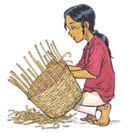Reference Texts
Organisations Helping Children

Return to Reference Texts

Various organizations exist to improve the standard of living for the world’s children. Here are a few, about which we invite you to learn more by visiting their web sites.

Established in 1945, the UN is a centre for international law concerning all problems that humanity faces, and consists of more than 30 different organizations who promote human rights, environmental protection, development, and fight against poverty and illness.
Branches of the UN define global practice with regards to the security and efficiency of air and sea transport and telecommunications. They work for consumer protection, intellectual property rights, and they coordinate radio frequencies. The UN leads international campaigns against drug trafficking and terrorism, and aids refugees. Water quality, food production, development loans, and economic stability are also issues that concern the UN, which includes some well known bodies such as UNICEF, UNESCO, and the International Labour Organization.

Created in 1946, UNICEF, under the General Assembly, is given the task to defend children’s rights, to help provide their essential needs, and to promote their full development. The UNICEF administration in New York also has 125 offices around the world, and 8 regional offices.

Created in 1919 by the Treaty of Versailles, the ILO survived the disappearance of the League of Nations and became in 1946 the first specialized institution of the United Nations. The organisations goal is to promote social justice and especially the respect for the rights of workers.
The ILO develops conventions and international recommendations that define minimum standards in the workplace such as the freedom to form unions, the right to organize and to collective agreement, the abolition of forced labour, and equality in opportunity and treatment. The organization also provides technical assistance in many domains such as professional training, employment policy, labour administration, employment rights and professional relations, working conditions, and labour statistics.
The ILO encourages the formation of independent organizations of employers and workers, and facilitates their growth through training and advice. At the heart of the UN, this body is unique in that employers and workers participate at an equal level with governments.

The WHO is the UN agency responsible for coordinating health services in an international context. Established since 1948, this organisation’s headquarters are in Geneva, Switzerland, where an annual World Health Assembly occurs in May of every year. The WHO is one organisation of the UN whose success is renowned.
The ultimate goal of the WHO is to achieve health coverage and prevention at a global level, where health is defined as physical, mental, and social well-being.

This movement of young catholic workers was founded in 1925 on the goal of constructing a new society based on solidarity, justice, equality, and peace.
Hence, the organisation seeks to improve working conditions, to provide housing for all, and to give access to potable water and transport. They also organise campaigns against unemployment, layoffs, and discrimination.

CIDA is a government organisaiton that assists sustainable development projects in hopes of reducing poverty and contributing to more prosperous and just world.
Canada is one of the most active countries in the promotion of children’s rights. In 1990, Canada was co-president of the World Summit for Children, and played a key role in negotiations that led to the signing of the UN Convention of Children’s Rights. Adopted in 1989, this convention made the world aware of the importance of protecting and promoting children’s interests and rights.
In June 2001, the organisation launched the CIDA Action Plan for the protection of children who are in need of special protection in order to promote strategic dialog and programs related to children’s rights.

The government of Quebec has delegated health and work safety to this organisation, whose goals are quite varied but include the prevention of work-related injuries while also acting as the public insurer of employees and employers, and also the enhancement of workplace safety. The CSST compensates injured workers and ensures that they receive proper medical care and for those that have suffered permanent injuries, that they can find meaningful work.

This organisation works for children’s rights both internationally and within Canada, with the goal of improving their living standards by defending their rights. Save the Children is non-political, non-denominational, and is devoted to long term community development through partnership with youth, government, and international organisations.
Save the Children focuses its efforts currently on 90 projects in these 10 countries: Canada, India, Kenya, Nicaragua, Haiti, Burkina Faso, Peru, Bolivia, Ethiopia, and Mali. The organisation belongs to the International Save the Children Alliance, whose members in 29 countries and projects in over 100 countries make it the most important international movement for children.

The CSTM organises educational and informative activities, campaigns, and cooperative projects contributing to developing solidarity between people here and in developing countries. This NGO contributes to awareness building through educational lesson plans and various activities.

Go to Top
|